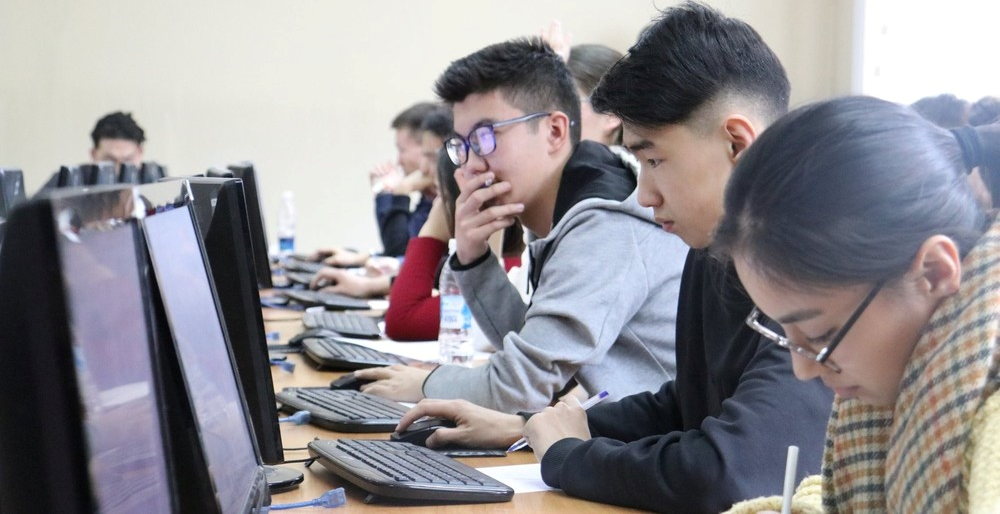 Raising learning outcomes takes a systemic approach across all levels of education. Photo: AKIPress
Raising learning outcomes takes a systemic approach across all levels of education. Photo: AKIPress
The Kyrgyz Republic’s transition since independence in 1991 has not been easy. The small central Asian country is a budding democracy that seeks a trajectory of more sustainable growth that is less dependent on remittances, natural resources, and a large informal economy. Nearly a quarter of the population lives below the international poverty line of $3.20 per capita per day, and many more live just above it. In addition, job creation is slow, and lags the pace of population growth.
In supporting the Kyrgyz Republic’s effort to tackle its challenges and to build evidence for better understanding of the links between education, skills acquisition, and the labor market, the World Bank conducted a survey of adult skills in late 2019. The focus was on literacy, numeracy, and problem-solving.
The survey explores the key cognitive and workplace skills needed for people to participate in society and for economies to prosper. It also provides a baseline on the levels and proficiency of education and skills of a representative sample of Kyrgyz youth and adults aged 16-65. (We used the same questions and approach as the OECD’s Program for the International Assessment of Adult Competencies surveys.)
It’s also important to note that one of the country’s greatest assets is its young population. School-age children account for more than 30 percent of the country. These children could become a skilled and enterprising workforce, leading to a more prosperous, formalized economy. But if the country misses the opportunity to invest in them, the future could be more challenging.
Most adults fall behind
The survey found that though the labor market in Kyrgyz Republic is increasingly seeking adults with strong foundational skills, a large portion of adults perform well below this foundational level.
Sixty percent of adults in Kyrgyz Republic had less than a basic understanding in literacy and numeracy. And 98 percent of adults did not have sufficient problem-solving skills in basic computer literacy. This compares to an average of 22% in literacy and 25% in numeracy respectively in ECA countries.
Most jobs in the Kyrgyz Republic require regular use of reading, writing, numeracy, and information and communications technology (ICT) skills. Higher-skilled groups of people earn higher wages, suggesting that the labor market rewards higher skills. However, the survey found that completing upper secondary education doesn’t equate to significantly improved skill levels. And though tertiary education is associated with higher skill levels, the skill levels remain low and vary significantly.
The Human Capital Index of 2020 updated the Kyrgyzstani HCI score to 0.6 from 0.58 in 2018 indicating the Kyrgyzstani children would only reach 60% of the full potential. The percentage of students performing below functional literacy may spike up to 97% due to the school closures during the COVID pandemic.
What does the future hold?
The message from the survey is somber but clear. A substantial share of the population has attended school but is under-skilled. Overall, the quality of education is an important driver of having low skills. Improving the quality of education at all levels and building foundational skills is the key to turning the downward trend around and to protecting and growing the human capital gains.
The government has recognized the gravity of the issues and has embarked on a set of policy measures to improve the learning outcomes in response to the recommendations on building strong foundational skills for Kyrgyz youth and adults.
- In early education, the government will implement new standards and programs to increase school readiness of children and expand equitable access for children of low-income households and underserved communities.
- In primary/secondary education, schools will implement competency-based curriculum for basic cognitive and non-cognitive skills. They will also raise teacher quality through professional development that links training and mentoring with classroom observations of teaching practice.
- In post-secondary and tertiary education including TVET, reforms will be adopted to align the curriculum and programs to employer and market needs to build better the foundational and transferable skills on demand.
It is the right time for the Kyrgyz Republic to seize the window of opportunity to ramp up the investment in human capital that helps build a skilled and enterprising workforce , reap the dividends of a youth bulge, enhance resilience to disruptive technology, and create quality formal-economy jobs for its large and fast-growing young population.
Initial Lessons Learned
The findings from the survey and the ongoing efforts to upskill youth and adults in the Kyrgyz Republic suggest that raising learning outcomes takes a systemic approach across all levels of education. Poor foundations in preschool and basic education may limit the impact of learning in later years through post-secondary and tertiary for maximized returns. To build the right skills, emphasis should be placed on the foundational skills, basic literacy, numeracy, problem solving and transferable skills which will enhance the resilience and learning skills that a changing world of work demands. Countries facing similar challenges may find these implications of interest.


Join the Conversation